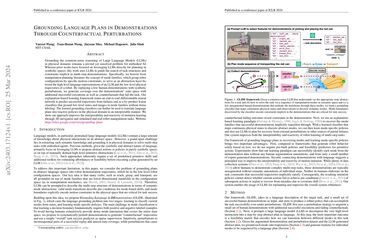Grounding Language Plans in Demonstrations Through Counterfactual Perturbations
Grounding the common-sense reasoning of Large Language Models in physical domains remains a pivotal yet unsolved problem for embodied AI. Whereas prior works have focused on leveraging LLMs directly for planning in symbolic spaces, this work uses LLMs to guide the search of task structures and constraints implicit in multi-step demonstrations. Specifically, we borrow from manipulation planning literature the concept of mode families, which group robot configurations by specific motion constraints, to serve as an abstraction layer between the high-level language representations of an LLM and the low-level physical trajectories of a robot. By replaying a few human demonstrations with synthetic perturbations, we generate coverage over the demonstrations' state space with additional successful executions as well as counterfactuals that fail the task. Our explanation-based learning framework trains an end-to-end differentiable neural network to predict successful trajectories from failures and as a by-product learns classifiers that ground low-level states and images in mode families without dense labeling. The learned grounding classifiers can further be used to translate language plans into reactive policies in the physical domain in an interpretable manner. We show our approach improves the interpretability and reactivity of imitation learning through 2D navigation and simulated and real robot manipulation tasks. Website: https://sites.google.com/view/grounding-plans
PDF Abstract
